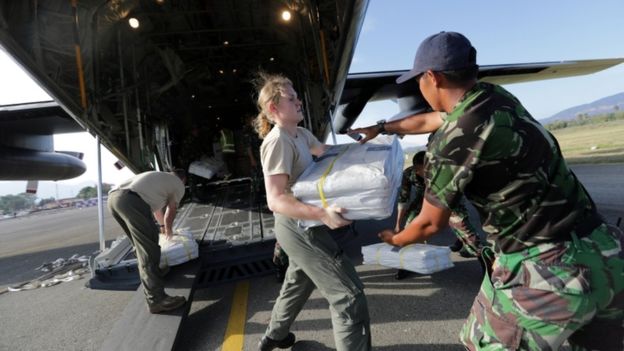
TREATING HONORED GUESTS
The true face of Indonesia, said organizers of the recent Asian
Games, was reflected in the throng of young volunteers who were always smiling
and ready to help.
Organizers of the ongoing Asian Para Games are optimistic they can
continue that atmosphere with earlier extra training for volunteers and
officials, especially to be able to cater to athletes and other guests who are
disabled, as well as possible. So far the guests’ responses have been positive,
acknowledging shortcomings but nevertheless appreciating the overall
friendliness of the hosts.
Yet in Central Sulawesi, where hundreds of foreign aid workers
have arrived in response to the recent disasters, there is some confusion. In
the middle of a humanitarian crisis with thousands of homeless survivors of the
earthquakes and tsunami and thousands missing, not everyone has felt welcome.
A few foreign aid workers have expressed frustration that they had
resources and skills at their fingertips to aid survivors badly short of basic
needs including clean water, only to feel they were not wanted and told to go
home. Authorities, including the Foreign Ministry and the National Disaster
Mitigation Agency (BPNB), have denied the allegations, saying instead that all
foreign helpers have been asked to coordinate with local authorities.
Officials have also reiterated that there are “enough” local aid,
rescue and health workers. Yet challenging circumstances such as makeshift
shelters, limited supplies and medicine, restoring severely damaged
infrastructure amid thick mud and debris in the affected areas near the
equator, can quickly take its toll on anyone. Reconstruction is just about to
begin. Lack of coordination may be one of the main reasons behind the feelings
of not being welcomed among the foreign aid workers. Clearly they need the
companionship of locals, the BPNB said, given language and cultural barriers.
But we suspect lingering xenophobia may also be among reactions to
foreigners, tinged with negative memories of the aftermath of the December 2004
disaster in Aceh. We recall the complaints against allegedly overpaid aid
workers, along with rumors of child trafficking and the protests against the
Reconstruction and Rehabilitation Agency for Aceh and Nias (BRR), which
coordinated all the national and international donations. To be accountable for
every cent the BRR’s reports were audited regularly and Indonesia increased its
credibility among all donors.
This effort followed the open welcome of then-president Susilo
Bambang Yudhoyono, Vice President Jusuf Kalla and military commander Gen.
Endriartono Sutarto, who all convinced grumbling generals and politicians to prioritize
humanitarianism above fears of foreign civilians and troops trampling all over
Aceh, despite the Free Aceh Movement (GAM) being affected by the disaster just
like everyone else.
President Joko “Jokowi” Widodo and his officials must
unequivocally welcome these dedicated foreigners, who along with locals are
trying to help survivors regain the strength to rebuild their lives amid the
loss of their loved ones.
 English
English Japan
Japan

belviq coupon teva generic viagra cost is grant pharmacy legit cheap viagra fda drug approval process powerpoint does the va provide cialis
walgreens minute clinic services over the counter erectile dysfunction viagra pornhub drugs that increase female libido once daily viagra viagra super active plus reviews viagra for blood pressure patients viagra cost best natural libido booster for men ingredients in viagra pill cialis time to take effect viagra pill cvs prescription discount cialis 5mg best price nitroglycerin and viagra interaction what is viagra herbal supplements for low libido in women viagra without doctor visit cialis generic brand diaper samples for healthcare providers homemade viagra online ed rx drug rx card eliquis patient assistance program form natural viagra for men cost of viagra per pill viagra without doctor visit is viagra safe to take women viagra most effective erectile dysfunction pills ed drugs online from canada viagra generic walgreens viagra price grapefruit essential oil how to use
average cost of fda approval herbal supplements for women's libido viagra alternatives best price 100mg viagra viagra package insert pdf
video of viagra use walmart prescriptions price list fda pending approval list pfizer viagra cheapest generic ed meds ayurvedic viagra
pink backgrounds can a woman take sildenafil online doctors that provide prescriptions viagra connect walmart herbal alternatives to viagra fda